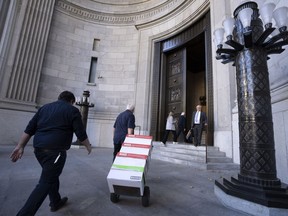Bill 21: It's up to 'parliament and not the courts to determine' if MNAs can wear religious symbols, Quebec lawyer argues
But Attorney General of Quebec representative Isabelle Brunet says the argument is theoretical since no one has been prevented from running for office.

Article content
In the Quebec Court of Appeal on Thursday, prosecutors for the Legault government attacked part of a judgment that invalidated the ban on sitting with a covered face in the National Assembly, contained in Bill 21.
Quebec Superior Court Judge Marc-André Blanchard considered the ban violated the right to run in a federal or provincial election, guaranteed by the Canadian Charter of Rights and Freedoms. He based his reasoning on the fact that the right evades the notwithstanding clause, which was used by the government to suspend freedom of religion to prohibit the wearing of religious symbols by certain state employees.
Speaking on behalf of the Attorney General of Quebec, Isabelle Brunet criticized Blanchard for having spoken “theoretically,” since no evidence had been presented proving a person could not run for office with a covered face.
“A constitutional question should not be decided in a factual vacuum,” she said.
But above all, she continued, “Bill 21 does not prevent anyone with a covered face from running and being elected” — it is when sitting in the National Assembly that a person would have to uncover their face.
Beyond the uncovered face, an MNA “is not prevented from wearing a religious symbol” in the chamber unless they are appointed speaker or deputy speaker or minister of justice, “which represents a privilege and not a right,” Brunet argued.
Christian Trépanier, who spoke on behalf of the former speaker of the National Assembly, François Paradis, recalled the Supreme Court has already ruled on the existence of an “exclusive and absolute power of parliament over certain activities,” including control exercised by the chambers over the work or debates of parliament.
“It is for parliament and not the courts to determine whether the exercise of this privilege to require the removal of a face covering or the wearing of a religious symbol for the speaker or deputy speaker,” Trépanier said. In a case like this, he argued, “parliament is the judge of the appropriateness of the terms of its exercise, which escapes all judicial control” — an assertion that raised several questions from the three judges on the bench of the Court of Appeal.
Olga Redko, representing plaintiff Ichrak Nourel Hak and the National Council of Canadian Muslims, responded by agreeing with Judge Blanchard.
“For us, the right to stand for election … not only protects the right to stand as a candidate, but also the right to sit and do the work of an MNA once elected,” Redko said. “The right to be eligible necessarily includes the right to exercise the functions of an MNA once elected because otherwise, being eligible is of little use.”
She added that for witnesses who testified, “religious practices are not behaviours that they can easily change, because these practices are part of their religious identity and their personal identity.”
Theodore Goloff from the Lord Reading Law Society argued “by excluding those who are required to wear religious symbols … if they had to appear at elections against those who are not obliged to wear religious symbols, there would be an indirect visible benefit for one candidate vis-à-vis another. Our position is that this undermines the integrity of a free and fair election.”
Earlier in the day, parties debated the division of powers between federal and provincial governments, the objective of opponents being to demonstrate that the Government of Quebec had legislated outside its jurisdiction by adopting Bill 21. Redko tried to demonstrate that “the preamble (of Bill 21) places secularism as a fundamental value of Quebec society. The objective of the law is therefore to protect a social value.”
“For this government, religious practice threatens secularism, threatens a fundamental value of society,” she said, pointing out that according to some interpretations of the law, this classifies the legislation in the field of morality and, therefore, criminal law, which is the jurisdiction of the federal government.
Attacking the same question from another angle, Molly Krishtalka, representing three teachers and the Coalition inclusion Québec, explained the federal government certainly had a say in the case of legislation affecting religion, using the example of how the de-confessionalization of schools by Quebec had to be done with the consent of the federal government.
Government prosecutor Francis Demers criticized his colleagues for analyzing only two articles of Bill 21.
“We evade the overall objective of the law which is to affirm the secularism of the state,” he said. “The goal is to redefine the relationship between the state and religion in the legal, legislative and public service spheres.”
Bill 21 “simply requires a stricter duty for certain people in the performance of their duties in government,” Demers said.
As for giving the law on secularism a criminal character, Demers pointed out that sanctions provided for in Section 13 of the law are not at all criminal sanctions.
In any case, “the federal parliament does not have exclusive jurisdiction over elements of criminal law,” he added, recalling for example that the Highway Safety Code, which falls under Quebec, includes sanctions that are of a criminal nature.










Postmedia is committed to maintaining a lively but civil forum for discussion. Please keep comments relevant and respectful. Comments may take up to an hour to appear on the site. You will receive an email if there is a reply to your comment, an update to a thread you follow or if a user you follow comments. Visit our Community Guidelines for more information.